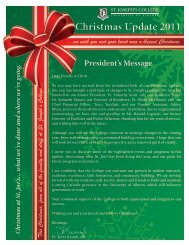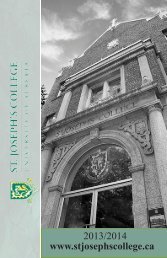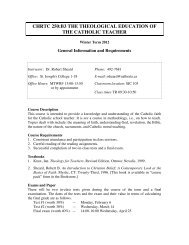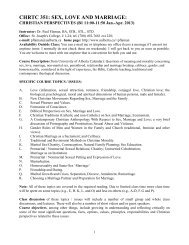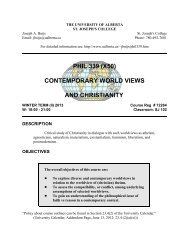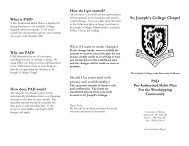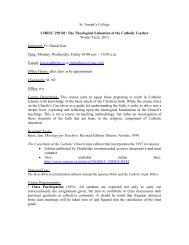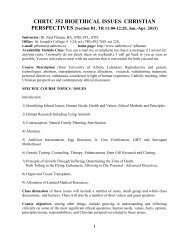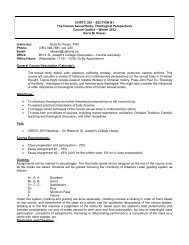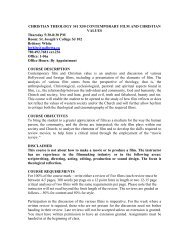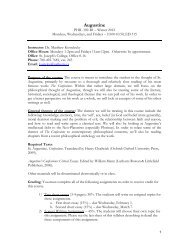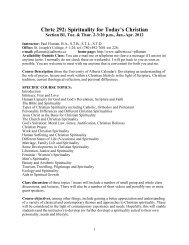CHRTC 351 - St. Joseph's College - University of Alberta
CHRTC 351 - St. Joseph's College - University of Alberta
CHRTC 351 - St. Joseph's College - University of Alberta
- No tags were found...
You also want an ePaper? Increase the reach of your titles
YUMPU automatically turns print PDFs into web optimized ePapers that Google loves.
Plagiarism and Cheating:2<strong>University</strong> <strong>of</strong> <strong>Alberta</strong> Calendar (Appendix „A”, Code <strong>of</strong> <strong>St</strong>udent Behaviour; online:www.u<strong>of</strong>aweb.ualberta.ca/gfcpolicymanual/content.cfm?ID_page=37633 ):Section 30.3.2 – Inappropriate Academic Behaviour:Section 30.3.2 (1) Plagiarism:No <strong>St</strong>udent shall submit the words, ideas, images or data <strong>of</strong> another person as the <strong>St</strong>udent‟s own in any academicwriting, essay, thesis, project, assignment, presentation or poster in a course or program <strong>of</strong> study.Section 30.3.2(2) Cheating:(a) No <strong>St</strong>udent shall in the course <strong>of</strong> an examination or other similar activity, obtain or attempt to obtain information fromanother <strong>St</strong>udent or other unauthorized source, give or attempt to give information to another <strong>St</strong>udent, or use, attemptto use or possess for the purposes <strong>of</strong> use any unauthorized material.(b) No <strong>St</strong>udent shall represent or attempt to represent him or herself as another or have or attempt to have himself orherself represented by another in the taking <strong>of</strong> an examination, preparation <strong>of</strong> a paper or other similar activity. Seealso misrepresentation in 30.3.6(4).(c) No <strong>St</strong>udent shall represent another‟s substantial editorial or compositional assistance on an assignment as the<strong>St</strong>udent‟s own work.(d) No <strong>St</strong>udent shall submit in any course or program <strong>of</strong> study, without the written approval <strong>of</strong> the course Instructor, all ora substantial portion <strong>of</strong> any academic writing, essay, thesis, research report, project, assignment, presentation orposter for which credit has previously been obtained by the <strong>St</strong>udent or which has been or is being submitted by the<strong>St</strong>udent in another course or program <strong>of</strong> study in the <strong>University</strong> or elsewhere.(e) No <strong>St</strong>udent shall submit in any course or program <strong>of</strong> study any academic writing, essay, thesis, report, project,assignment, presentation or poster containing a statement <strong>of</strong> fact known by the <strong>St</strong>udent to be false or a reference to asource the <strong>St</strong>udent knows to contain fabricated claims (unless acknowledged by the <strong>St</strong>udent), or a fabricatedreference to a source.Section 30.3.2 (3) Misuse <strong>of</strong> Confidential Materials:No student shall procure, distribute, or receive any confidential academic material such as pending examinations,laboratory results, or the content there<strong>of</strong> from any source without prior and express consent <strong>of</strong> the Instructor.Required Notes: Policy about course outlines can be found in 23.4(2) <strong>of</strong> the <strong>University</strong> Calendar (GFC 29 SEP 2003). The <strong>University</strong> <strong>of</strong> <strong>Alberta</strong> is committed to the highest standards <strong>of</strong> academic integrity and honesty. <strong>St</strong>udents areexpected to be familiar with these standards regarding academic honesty and to uphold the policies <strong>of</strong> the <strong>University</strong>in this respect. <strong>St</strong>udents are particularly urged to familiarize themselves with the provisions <strong>of</strong> the Code <strong>of</strong> <strong>St</strong>udentBehaviour (online at www.ualberta.ca/secretariat/appeals.htm) and avoid any behaviour which could potentially resultin suspicions <strong>of</strong> cheating, plagiarism, misrepresentation <strong>of</strong> facts and/or participation in an <strong>of</strong>fence. Academicdishonesty is a serious <strong>of</strong>fence and can result in suspension or expulsion from the <strong>University</strong> (GFC 29 SEP 2003).Course Outline:I. Preliminaries:An introduction to the foundational terminology and methodology related to Christian theological/ethicalthought and action. Some example topics are: revelation, faith, belief, decision-making, conscienceformation, Vatican II, spirituality, church, laity, method in theology, sources <strong>of</strong> theology, feminism,historical worldview, classicist worldview, pluralism, ecumenism, inclusive language, hermeneutic <strong>of</strong>suspicion.II. Human Development and Human Relationships:An exploration <strong>of</strong> issues and questions related to healthy human development and human relationships.Some example topics are: self-esteem, men‟s and women‟s roles, authenticity, fidelity, humanexperience, physical contact, maturity, compassion, grace, love, dualisms, fruitfulness, friendship,passions, development and growth.III. Human Sexuality and Sexual Expression:A more specific look at factors involved in human sexuality and sexual expression. Some example topicsare: sexual revolution, feminist movement, ambiguity and ambivalence, sacramentality, abuse, violence,sexual orientation, masturbation, chastity and celibacy, birth control, sexuality as gift, right relation, andembodiment.IV. Christian Marriage:



